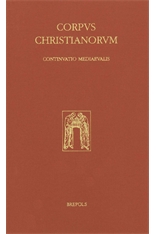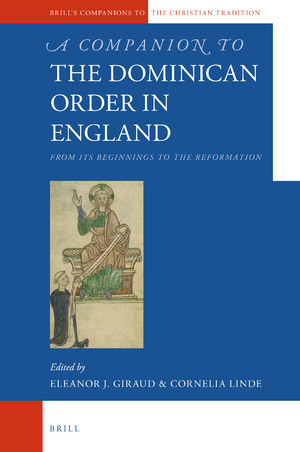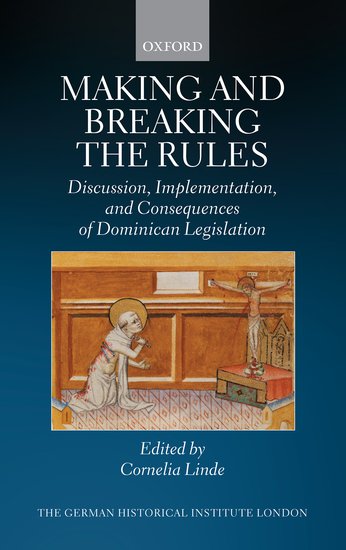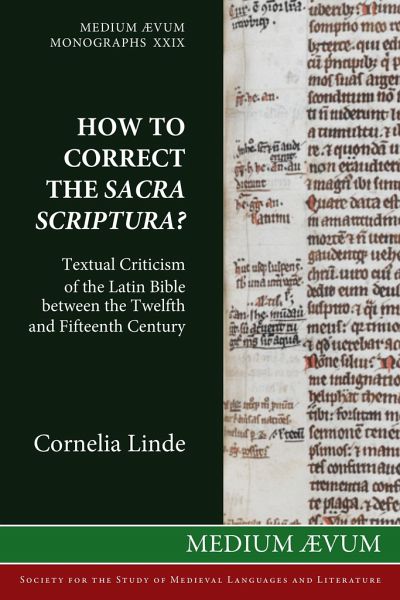Monographien und Herausgeberschaften/Books
hg. v. Eleanor J. Giraud und Cornelia Linde (Brill's Companions to the Christian Tradition, 97), Leiden: Brill, 2021.
Umfang: xii, 432 pp.
DOI: https://doi.org/10.1163/9789004446229
Reihe: Brill's Companions to the Christian Tradition, Band: 97
A Companion to the English Dominican Province offers an account of Dominican activities in England, Ireland, Scotland, and Wales from their arrival in 1221 until their dissolution at the Reformation. Over the three centuries covered in this volume, the Friars Preachers not only devoted themselves to the cure of souls via preaching and hearing confessions, but they also represented English kings on diplomatic missions, influenced politics and society, and contributed to cultural, intellectual, and religious life across the British Isles.
E-Book (PDF)
Status: Publiziert
ISBN: 978-90-04-44622-9
Publikationsdatum: 22 Feb 2021
Festeinband
Status: In Herstellung
ISBN: 978-90-04-38703-4
Publikationsdatum: 25 Feb 2021
Inhalt/Details/Downloads
Chapter 1 The English Dominican Province from Its Beginnings to the Reformation: An Introduction (Beschränkter Zugang)
AutorInnen: Eleanor J. Giraud und J. Cornelia Linde
Seiten: 1–30
Part 1 Space and Place (Beschränkter Zugang)
Chapter 2 Dominicans in England and Their Relations with the Crown (Beschränkter Zugang)
AutorIn: Jens Röhrkasten
Seiten: 31–68
Chapter 3 Dominican Friaries in the Medieval Landscapes of Britain and Ireland: A Comparative Study (Beschränkter Zugang)
AutorIn: Anne-Julie Lafaye
Seiten: 69–111
Chapter 4 The Dominicans in Scotland, 1230–1560 (Beschränkter Zugang)
AutorIn: Richard Oram
Seiten: 112–137
Chapter 5 The Dominicans in Wales (Beschränkter Zugang)
AutorInnen: Janet Burton und Karen Stöber
Seiten: 138–180
Part 2 Preaching and Pastoral Care (Beschränkter Zugang)
Chapter 6 Master Jordan of Saxony and Early Dominican Preaching in England (1229–1230) (Beschränkter Zugang)
AutorIn: Steven Watts
Seiten: 181–214
Chapter 7 Pastoral Care: Dominican Friars as Confessors and Catechists in 13th-Century England (Beschränkter Zugang)
AutorIn: Andrew Reeves
Seiten: 215–244
Part 3 Education and Intellectual Life (Beschränkter Zugang)
Chapter 8 The Educational Landscape of the English Dominican Province (Beschränkter Zugang)
AutorIn: J. Cornelia Linde
Seiten: 245–273
Chapter 9 The English Dominican Intellectual Tradition (Beschränkter Zugang)
AutorInnen: John T. Slotemaker und Jeffrey C. Witt
Seiten: 274–302
Part 4 Devotional Cultures (Beschränkter Zugang)
Chapter 10 “Do It Well and Thoroughly, for It Will Be Shown to Important People”: Art in the English Dominican Province, ca.1221–ca.1540 (Beschränkter Zugang)
AutorIn: Alexander Collins
Seiten: 303–342
Chapter 11 Dominican Chant and Liturgical Practices in the English Province (Beschränkter Zugang)
AutorIn: Eleanor J. Giraud
Seiten: 343–369
Chapter 12 The Liturgical Manuscripts of the English Dominicans, ca.1250–ca.1530 (Beschränkter Zugang)
AutorIn: Nigel J. Morgan
Seiten: 370–408
Back Matter
Manuscripts Index (Freier Zugang)
General Index (Freier Zugang)
hg. v. Cornelia Linde, Oxford: Oxford University Press (Studies of the German Historical Institute London), 2018.
The Dominican Order's exponential growth in the first decades of its existence brought with it the challenges of providing a stable organizational framework for the order and its members, and maintaining unity and cohesion, from local to provincial and order-wide levels.
This volume takes an interdisciplinary approach to exploring the theory and practice of introducing order in all areas of Dominican life by means of rules and guidelines. With the rich transmission of acts of Dominican general and provincial chapters providing a fruitful starting point, the essays branch out to take account of a wide range of materials, including literary sources, codicological and musicological evidence, and architectural remains. Among the overarching questions asked are: by what means were rules and guidelines disseminated and implemented in the Dominican Order; what impact did they have and what were their intended, but also unintended, consequences; and what were the effects and outcomes of not following the rules laid down by the Order. The volume asks whether the historical evidence in normative sources such as the Acts of the General Chapters, widely used as a point of reference in modern scholarship, might represent an inaccurate and incomplete picture of the Order, one which was far removed from the reality on the ground.
Reviews
"This volume thus offers a fresh and balanced view of Dominican law and practice, especially due to its thematic, geographical and chronological breadth. It will stimulate further comparative research on subjects and regions that remain underexplored in institutional and religious history, e.g. Dominican communities in the Iberian and other provinces somewhat outside of the scholarly mainstream."
(Lidia Negoi, Sehepunkte 19 (2019), Nr. 9 [15.09.2019]], URL: http://www.sehepunkte.de/2019/09/31914.html)

hg. v. Cornelia Linde, Turnhout: Brepols (Corpus Christianorum: Continuatio Mediaevalis, 262), 2013.
Active in Rome in the mid-twelfth century, Nicolaus Maniacoria was a productive and versatile author, editor and scribe. In the introduction to his main work, the Suffraganeus bibliothece, Maniacoria offers what are perhaps the most detailed medieval explanations for scribal errors in manuscripts. The main part of the text consists of brief comments on the canonical books of the Old Testament. His exegetical work distinguishes itself by two features. First, Maniacoria focuses on the literal sense and explains uncommon words. And secondly, the Suffraganeus bibliothece reflects his interest in the Hebrew Bible and Jewish exegesis. His most important Jewish sources are Rashi and Abraham ibn Ezra, whom he might have known personally. Furthermore, Maniacoria offers biblical variants that are not attested in the Latin tradition but that agree literally with the Hebrew. The Suffraganeus bibliothece thus constitutes an early example of twelfth-century Christian Hebraism.
Der Römer Nicolaus Maniacoria (fl. Mitte des 12. Jahrhunderts) war ein produktiver und vielseitiger Autor, Herausgeber und Schreiber. Die Einleitung zu seinem Hauptwerk, dem Suffraganeus bibliothece, beeindruckt durch die in der Einleitung enthaltenen, bemerkenswerten Überlegungen zur Entstehung von Überlieferungsfehlern. Der Hauptteil des Textes setzt sich aus knappen Kommentaren zu den Büchern des Alten Testaments zusammen. Zum Einen zeichnet Maniacorias exegetische Arbeit sich durch seinen Fokus auf den Literalsinn sowie seine Erklärungen ungewöhnlicher Worte aus. Zum Anderen spiegelt sich in dem Text sein Interesse am hebräischen Bibeltext und jüdischer Exegese wider. Seine jüdischen Hauptquellen sind dabei Raschi und Abraham ibn Esra, den er vielleicht persönlich kannte. Auch bietet Maniacoria einige biblische Lesarten, die sonst nicht in der lateinischen Überlieferung belegt sind, die aber wörtlich mit dem Hebräischen übereinstimmen. Der Suffraganeus bibliothece ist somit ein frühes Zeugnis des wachsenden Interesses christlicher Gelehrter an der hebräischen Bibel sowie jüdischer Bibelauslegung.
Reviews
"Scholars interested in the textual criticism of the Bible and the history of Christian Hebraism in the Middle Ages will benefit the most from Linde's new edition of the Suffraganeus Bibliothece. The taxonomy of scribal errors presented in the introduction to Maniacoria's work remains especially interesting, in contrast to the main body of the text, which is largely derivative of early medieval authorities. Even so, the fact that it is aimed at elementary readers makes the Suffraganeus Bibliothece a useful source for introducing students with some knowledge of Latin to the rich tradition of biblical glosses that Maniacoria distills so economically in this commentary."
(Scott G. Bruce, in The Medieval Review 15.04.17.)
"Après plusieurs savants chercheurs et éditeurs, R. Weber, V. Peri, voici que Cornelia Linde apporte une contribution essentielle à la connaisance de Nicholas Maniacoria."
(P.-M. Bogaert, dans: Revue bénédictine (2015/1), 206-207.)
"Mit dem vorliegenden Band ist nunmehr eine kritische Erstedition des gesamten Werkes erschienen, in deren Einleitung es der Herausgeberin zudem auch gelungen ist, die Erkenntnisseüber das Leben und Werk Maniacorias zu revidieren und zu erganzen."
(A. Loose, in: Mittellateinisches Jahrbuch 50 (2015) 504-506.)
« Les Victorins postérieurs, précisément, et l’humanisme, à travers Bessarion qui le propose en introduction du texte biblique, donneront une postérité à cette œuvre unique et majeure pour l’histoire de l’exégèse, qui est ici éditée et introduite dans les règles de l’art. »
(A. Noblesse-Rocher, Revue d’Histoire et de Philosophie Religieuses, 95/4 (2015), 491.)
Oxford: The Society for the Study of Medieval Languages and Literature (Medium Ævum Monographs. New Series, XXIX), 2012.
This study deals with Latin texts from the twelfth to the fifteenth century that discuss the emendation of the Latin Bible. After consideration of the medieval terminology for different versions of the Bible, it offers an overview of the transmission of the Latin Bible in the Middle Ages and its medieval editions. A survey of the cult of Jerome precedes an investigation of statements by textual critics about the status of the Vulgate and other versions of the Bible. The main body of the work is dedicated to the authors’ views of the textual tradition by examining their statements on the status of Hebrew, Greek and Latin manuscripts for the emendation of the Latin Bible. Finally, this study explores the struggle between consuetudo and veritas and the role of grammar in the emendation of the Latin Bible.
Reviews
This is an important book. It addresses a number of frequently raised questions which have been awaiting an attempt at a coordinated answer. In Part I Dr Linde begins by looking at the basic vocabulary. What does vulgata mean in the Middle Ages, or septuaginta or Hebraica veritas or Graeca veritas? Part II examines the Vulgate and the lingering use of the Vetus Latina until the ninth century. Medieval respect for Jerome sharpened only with the fourteenth century. The medieval ‘editions’ of the Bible in which attempts were made to restore corrupted text are explored. In some cases, these efforts had puzzlingly little influence. The work of Isidore in this area has not survived and that of Cassiodorus seems to have faded from medieval notice. Alcuin’s attempt was more influential, partly...
(G. R. Evans, The Journal of Theological Studies, Volume 64, Issue 1, April 2013, 296-297, https://doi.org/10.1093/jts/flt018)



